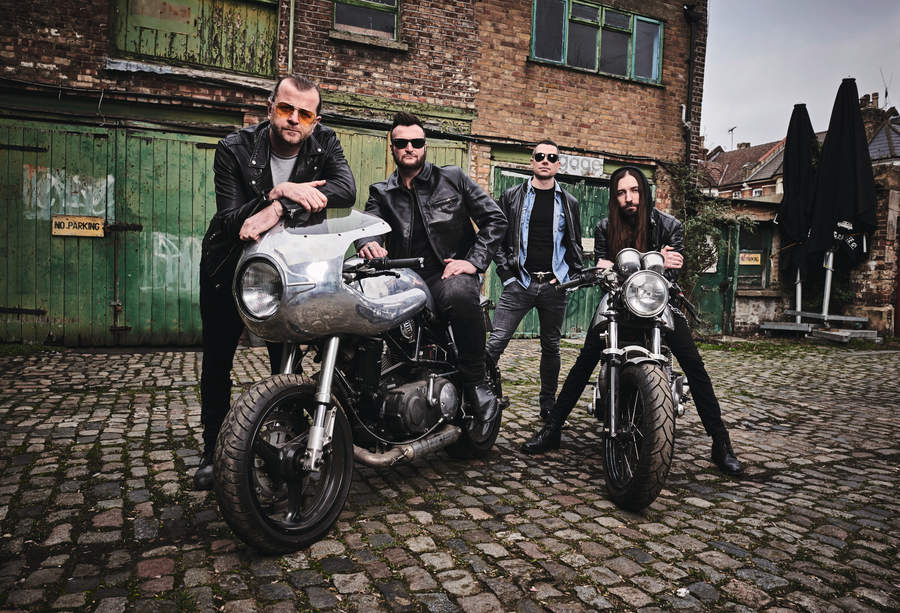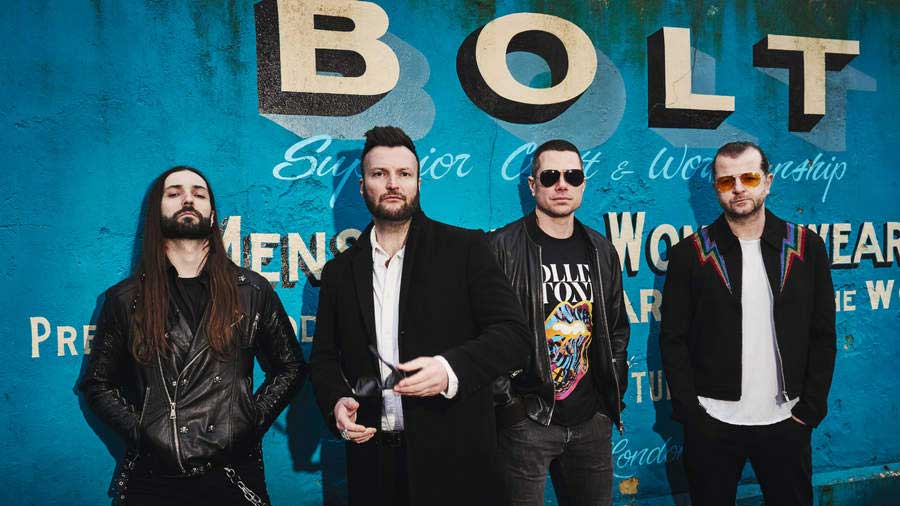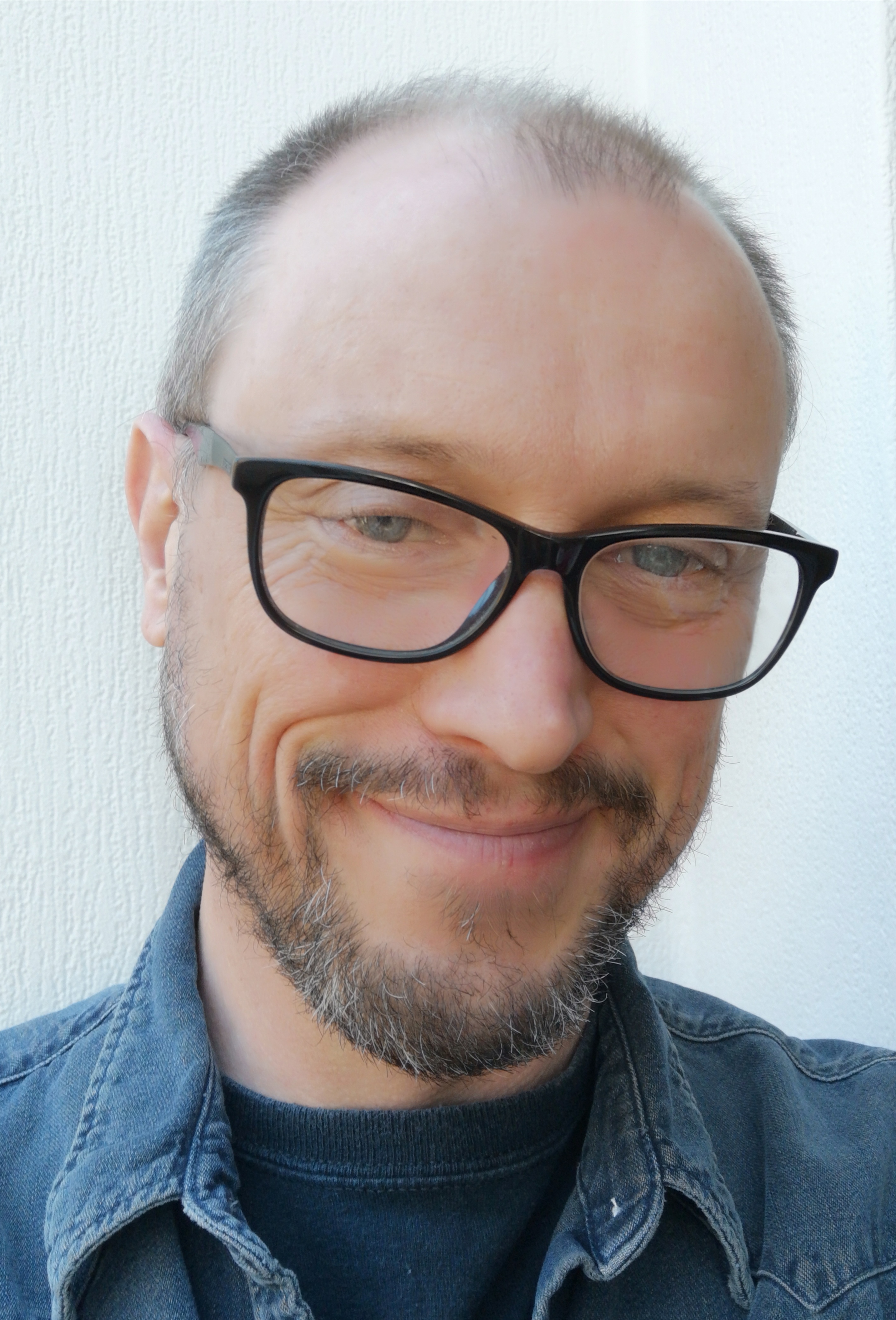Last summer The Dust Coda played the weekend-long Rock Imperium Festival in Cartagena, Spain. Scorpions, Europe and Black Label Society were among the headliners, and although the London quartet’s stage time was 2am, the gorgeous marina location, balmy weather and the famous Spanish disregard for an early night ensured that this was no graveyard slot.
“I’d spent eight hours drinking white wine and eating tapas,” singer John Drake recalls. He’s Australian, and everything he says sounds sunnier for it. “We watched Europe, Black Label Society, Scorpions, and then we had this signing. All these kids came up with Dust Coda T-shirts and posters, wanting photographs. It was really cool.”
After a nap on a bench under palm trees, Drake was roused by the strains of Mr. Big’s hit To Be With You, as that band’s singer Eric Martin was rounding off his acoustic set, late. By now it was nearly 3am and Drake was worried. “I’m thinking: ‘Is this gonna be a good gig?’ I take a peek, and there’s thousands of people there waiting. Three in the morning in Spain. Hot as fuck. We’re all on different levels of sobriety, and we go out there, and the Spaniards lose their shit! It was the wildest gig we’ve played.
“There’s kids in our T-shirts, flying our banners, and they know every word. Our song Breakdown has a singalong part in it, and it was huge. We finished by debuting a new song, Road To Hell, and they went apeshit. By the end they were singing the chorus back to us, the motherfuckers! I’ve told our agent I definitely want us to go back to Spain.”
That full-frontal modern riff-rocker Road To Hell opens The Dust Coda’s new album, Loco Paradise. It’s the third of their ten-year career, and it’s a doozy. As ever, their music straddles classic rock from the 60s (Exile-era Stones), 70s (Zeppelin), 80s (big-time Guns N’Roses vibes and AC/DC anthemics), while Drake’s powerful, versatile voice can tug at the heart and soul with more modernclassic, Chris Cornell-like tones. The Dust Coda cocktail also comes with a shot of Aerosmith, The Black Crowes, and maybe a poppy dash of Train too. It’s all the good stuff in one hit.
We speak to them on the day they’re announced as one of the bands supporting GN’R on their June show in London’s Hyde Park, along with The Darkness, The Pretenders and Larkin Poe.
“You don’t need to be a rocket scientist to hear Guns N’ Roses’ influence in our songs,” guitarist Adam Mackie says, with a knowing laugh. “It’s a good match. It’ll be our first gig of the year – what a way to kick off the Loco Paradise era.”

In the six years since the release of their self-titled debut album, the group – completed by bassist Tony Ho and drummer Scott Miller – have worked hard to build their fan base. Leading up to that monumental Spanish gig and this year’s GN’R show, they’ve made regular, winning appearances at credible events, among them Ramblin’ Man Fair (RIP), Holland’s Paaspop and Wales’ Steelhouse Festival.
They’ve become regulars on UK rock radio through signature tunes such as Limbo Man, Breakdown and Jimmy 2 Times (the latter appeared on Classic Rock’s ‘The Soundtrack Of Our Lifetime’ list in issue 300). Support slots with Black Stone Cherry, Adrian Smith and Ritchie Kotzen and Glenn Hughes’ old supergroup The Dead Daisies have helped them carve their niche in the New Wave Of Classic Rock scene.
It was 2021’s Mojo Skyline, The Dust Coda’s self-made second album, that won them a deal with Earache Records, whose impressive roster includes Those Damn Crows, Massive Wagons and The Glorious Sons. As for the new one, The Dust Coda recorded proper live demos last March at Otterhead Studios inWarwick, focusing on the songs shortlisted for the album.
“We sent seventeen songs to Earache,” Adam Mackie recalls, “and they just said yep, go and make the album. Tracking the songs live got us in the zone, the label gets a buzz and so do you. It sets the bar, and you start the journey.”
The album itself was recorded at Chapel Studios in Lincolnshire with producer Charlie Russell (who’s worked with artists ranging from Take That to Wargasm), but performances from those demos made it to the final record, among them Drake’s raw yet spirited acoustic guitar take for his sweet lockdown ballad The Streets. There’s a pleasing, barely perceptible finger-slip towards the end of it that brings the take alive. Such little human flaws are so easily wiped away out in the digital age, but Mackie and the band expressly wanted to keep them in.
“We’ve gone old-school,” the guitarist says. “There’s little studio noises after songs, like talking off-mic, and a bit of dicking about. At the end of [strident banger] On Fire there’s some wanky guitar crap, and you can hear it’s a piss-take. On Road To Hell, John threw in this [gravelly, Axl Rose-y] overdub at the end of the interlude – ‘You know what I mean?’ Before we heard it he said: ‘Look, I’ve done something amazing and you’re gonna hate it.’ But it was so good, so Gunners it had to stay on. If I was fifteen I’d think it was the coolest thing ever.”
Late one evening at Chapel, Miller laid down the drums for Road To Hell with a view to the band picking things up the next day. Cut to a few hours later and, Mackie remembers with glee, “it’s three in the morning and we’re smashing the whisky, going: ‘Fuck yeah!’ and the whole track was finished. The vibe on that song! You can hear it. It was late and we were just: ‘Let’s go!’
“We’re at a certain age now, but we’ve got such childlike enthusiasm when it comes to making music, and I just fucking love this album. Everyone’s performances are off the scale. We worked our tits off, we were rehearsed. What you’re hearing is a band in their prime. We were on the money.”
Now 41, Mackie was literally a child when his enthusiasm for music began. He was seven when his dad played a cassette of Eric Clapton’s 1989 album Journeyman, and the warmly overdriven, tastefully wahwah’d intro riff of Bad Love promptly blew the young boy’s mind. At 14 he got his first electric guitar, and since then he’s never looked back.
After studying at the Academy Of Contemporary Music in Guildford (with leading shredder Guthrie Govan among his tutors) he spent the 2000s cutting his teeth in successful electro-rock bands, playing for the likes of Freestylers and garage singer Valerie Maxfield.
“We played for sixty thousand people in a festival in Budapest all raving away,” he recalls. “It was an amazing experience, I was playing with insane-level musicians, but it wasn’t rock music. I’d bought a Les Paul and a Marshall stack for a reason, you know?”
In 2013 he auditioned for a place in a band centred on a promising Australian singer-songwriter. John Drake had come over to London from Brisbane eight years earlier. “I just wanted to throw myself at the world,” he says now. “The UK felt like the biggest mountain I could climb as a young, aspiring singer-songwriter. At that time in London guitar music was still massive – Queens Of The Stone Age were huge, Velvet Revolver, Jet, The Strokes had smashed it. It was an amazing time to be an artist.”
Although their initial band together fell apart, Mackie and Drake impressed each other. They hung out at the guitarist’s Brixton flat, drinking Red Stripe and demoing long, involved rock songs on GarageBand, including the debut album’s pretty, ersatz Zeppelin ballad Sweet Love Is Gone.
“We wrote enough good stuff that we thought we had something,” says Mackie. “We filled the car with gear, food and booze and went up to my family home in Northumberland in the winter, and just wrote.”
As a self-styled singer-songwriter, Drake had started out under the influence of Jeff Buckley, Ryan Adams, Thom Yorke and even David Gray. But he says these heavier songs brought out a new dimension of his vocal talent: “Something just clicked. Something different came out of me from the songs that we’re writing together. We gelled on a sonic vibe. We’ve both got pretty much the same music taste. We decided that The Dust Coda had to be modern classic rock’n’roll, and my voice started coming out naturally.”
As Loco Paradise proves, The Dust Coda can do straight-ahead, machined-tooled singalong stadium anthems (On Fire, Call Out The Dogs), hooky riff work (Come The Night, catchy single Fairweather Love), and have elegant melodies in spades. But what marks them out is how they take conventional songs and bend them slightly, elevate them with a twist, a detail. In the infectious outro of Love Sick, Drake layers his vocals into a Stonesinspired gospel choir.
“It’s a cliché,” he says, “but in [the Stones’] Gimme Shelter you’ve got amazing African-American female soul singers double-tracked in symphonic majesty. I wanted that for Love Sick. So I did my best impersonation of an incredible gospel choir from the southern States.”
A cliché maybe, but it works, as does the handbrake turn in the middle of Since You’ve Been Gone, which morphs from a sweet, Stairway-esque ballad into a bass-charged headbanger.
“I was thinking Iron Maiden-meets-Muse,” Mackie says. “John asked why, and I said: ‘Yeah, but why not?’ And the band thought it was brilliant. Free All The Dancers is the same – you go from a very Slash/Alter Bridge thing, John’s singing and his hooks on the chorus are insane, and then for the outro I said: Layla. Let’s just do Layla, and enjoy it, give the listener a treat a breather. Again when we were writing John was a bit unsure, but I said don’t worry, go with it.”

These touches carry on right to the end of the closing track, It Won’t Be Long. Its ear-worm chorus transforms into a hummed/ahhh’d motif that repeats hypnotically, the album drifting away on some nifty sound design.
“I nicked that off Prostitute, from [GN’R’s] Chinese Democracy,” Mackie says with a cheeky smile. “I told our producer, Charlie: You’re the captain on Dust Coda Airways. You’re flying into Miami in the sunset and you’re saying: ‘Thank you for flying TDC Airways. We hope you’ve enjoyed your flight, see you next time.’ Keep the beat, keep the vocal, but do some ‘producer stuff’ and fly us out.
“We definitely had a zero-fucks attitude. We knew there’d be an album, with singles, and they’re fucking great. But there were other things we thought were great too that we did not want to change. It was a challenge, but we delivered an album to the label, and I think we just about got away with it.”
After the Guns N’ Roses show there’ll be aUK club tour in October, and more stuff in the pipeline – presumably a Spanish gig or two, and more fan interaction sure to come. Drake, for one, clearly thrives on that.
“I don’t check the numbers, I don’t know how big we are,” he says, “but I do know we’ve got these fans who love us, and I love them. They’ll tell us: ‘You signify all my favourite bands in one band.’ Or they’ve gone through some terrible heartbreak and a song of ours has helped them throughout that period.
“People are connecting with that thing I wrote in a room, that got transformed in a room with Mackie, then in a rehearsal room, then a studio. Eventually it ends up on vinyl on someone’s record player, and that’s the most amazing journey in the world. I don’t ever want to stop, because I fucking love it.”
Loco Paradise is out now via Earache Records.

